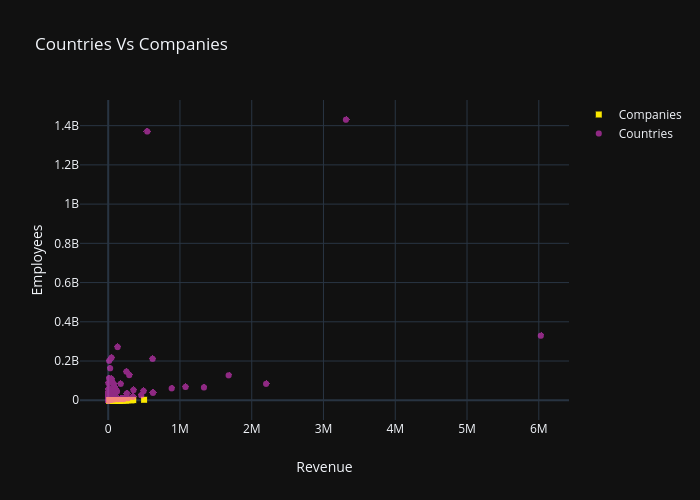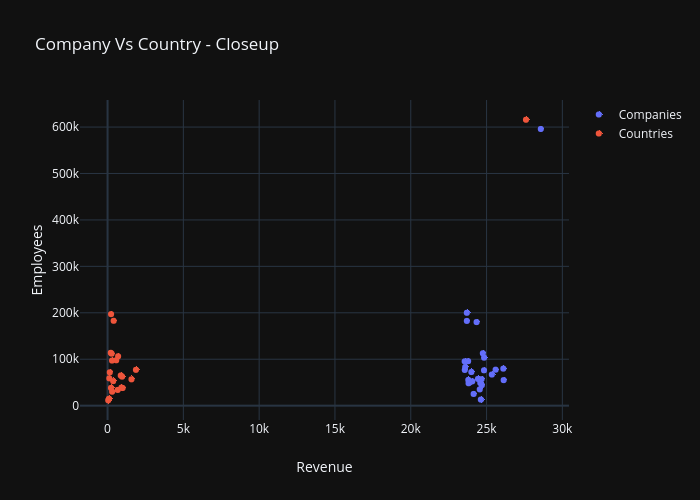Which Country is closest to Your Company?
In an interview with a Fortune 100 company, the panel asked me if I knew how big the company was. I told them that they are bigger than the Maldives. My answer prompted me to start thinking about how big some of these companies are and what kind of influence they bear on geopolitical events and how closely their affairs are laced with Countries. According to globaljustice 157 of top 200 economic entities are corporations not countries. Although the article views this development in poor light, I think it the world is better off with powerful corporate than powerful politicians.
In my opinion, we are still comparing elephants and camels. If you judge them basis their strength the elephant will win and if you judge them on their ability to survive without water the camel will win. But I think the discussion is still relevant because countries don't go to war it is the companies that go to war these days. Be it Hewaiwe vs US or Ericson's rumored involvement in foiling Iran's nuclear development through Stuxnet, companies are increasingly on the front line. In this blog, the author argues that firms have developed into quasi-cartels capable of influencing the paths of entire countries through their intimate connections to the centers of power.
A company like Wall-mart employs a workforce as big as Gabon or Qatar (in terms of population). In terms of revenue, Walmart surpasses the GDP of entire countries like Austria, Iran, Norway, etc. With half a trillion in revenue, Walmart's revenue is bigger than the 25th largest country in terms of GDP.
Well now, GDP and revenue are not comparable. But neither are companies and countries additionally, I thought it would be fun looking at countries and companies that are close to each other. To make the comparison a little more palatable, I used the country revenue (or tax collection or budget). The other dimension used to make the comparison is employees (for companies) and population (for countries). We are still comparing elephants and camels.
Here is a scatter plot of Revenue and Employees ( or Budget and Population) and you see that companies pretty-much are stuck to the ground on account of their employee count.
I started with using KNN but then resorted to using simple, non-standardized Euclidean distance since the results are more intuitive.
Here are some closest company-country neighbors.
Note: I used euclidean distances without normalizing or standardizing the data. The code and data used is here.
If you look at the first closest pair Luxembourg and Compass Group they are really close.
Compass Group $28.5 Bil (Rev) Employs 595, 841
Luxembourg $27.6 Bil (Rev) Population 615,729
They certainly look comparable. Now, if look at the Gross value added by Luxembourg it is a staggering $62.88 billion. Whereas the value compass group generated would be between $2.4 Billion to $2.8 Billion at best (accounting for currency fluctuations). Why is a country, run by politicians, more efficient than a company run by appointed CEOs? Note that the Luxembourg population includes children, pensioners, and non working population. As flawed as this comparison maybe, I want to use this to take us to our next set of discussions about people who make up these entities and their motivations.
Both companies and countries are mental constructs with legal existence and some perpetuity. They are made of people who have dual identities. Every employee is also a citizen and a large number of citizens are also employees. But in most cases, surprisingly, our national identities takes precedence over our employee identity. I say surprisingly because companies pay your salaries and countries tax you. If I were an economist I may have been tempted to think that Individuals are loyal to their companies than to countries.
Although our employee identity rarely conflicts with national identity, I am fairly certain that most people will choose their countries over their companies. You will notice this in social media when a country is shown in bad light people jump to defend its position. On the other hand when there is bad news about a company, sometimes, even the employees chime in and troll the company. An India Pakistan conversation is intense and emotionally charged compared to a NetApp - EMC or an Apple-Android conversation. People join the army willing to die for their countries. No employee is willing to let go of his/her salary let alone life.
Let's now look at the people who control these entities. CEO, executives vs National leaders and Ministers. The CEO and executives are appointed leaders. Shareholders and the board have a say in who should be the CEO, not the employees. The national leaders are elected by citizens. (150 of 195 countries are republics[wiki]). A CEO is driven by profits, cash-flow and shareholder value. A national leader is driven by popularity and power, not value, not profits.
Countries like Singapore or regions like Hong Kong have a reputation for being run like corporations. Although these are smaller regions with high Gini index, they seem to have fared well. More and more countries may come to be run like businesses. It was also a recurring theme in Donald Trump's election campaign that he'll run the country like a business[hbr][wp].
Companies unlike Countries, are better incentivized to bring innovation to market. Their innovations will disrupt the geopolitical status quo. For example, If facebook's libra is adopted widely it may make some of the central bank's functions redundant. Drones, and other airborne mobility assistants, self-driven cars, etc. will be produced and sold by corporations but countries need to regulate their use/abuse. The relationship between countries and companies is going to be increasingly intertwined.



Comments
Post a Comment